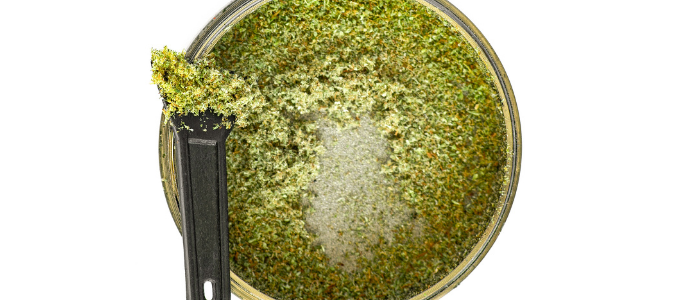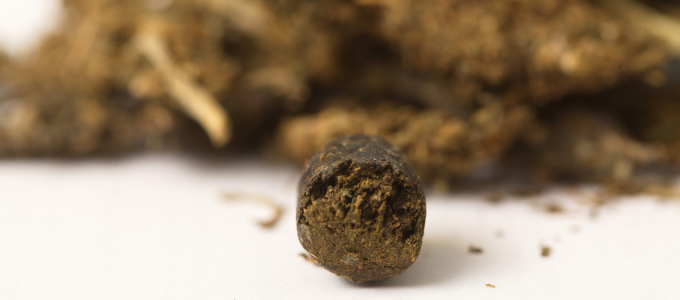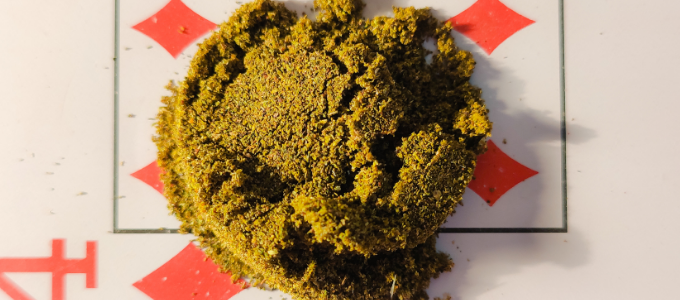
Frazier vs Ali. Coke vs Pepsi. Red Sox vs Yankees. Kief vs Hash.
Fortunately, there is no rivalry between kief vs hash – just some key differences.
Both are great ways to get high, though there are changes in composition, production, and ingestion that make each unique.
By the end of this article, you’ll know everything there is to know about both hash and kief.

· Kief – an accumulation of trichomes sifted from cannabis flowers with a mesh screen.
If you’ve ever used a grinder, odds are you’ve already run into some kief on your own. Kief is the small, powder-like substance you’ll find in a kief catcher. Most grinders are equipped with one on the bottom third portion. When using the grinder to break down flower, the smaller cannabis particles fall down to the kief catcher. These are among the strongest parts of the cannabis plant – kief can get you really high. Kief contains the highest concentration of cannabinoids (THCA, CBD, etc.) in the entire plant.
· Hash (hashish) – a concentrate created by pressing the resin glands of the cannabis plant together.
Hash is essentially pressed and heated kief. When pressed, the composition of the kief changes. Kief itself is like a powder – hash is more akin to soft brick. This hash can be ingested on its own or used to make other concentrates. All concentrates – wax, shatter, oils – are essentially made from hash. Hash can be many different colors but is typically brown, green, or tan.
Kief: Comes from an Arabic word meaning “pleasure.” This makes only makes sense, as kief holds some of the highest amounts of cannabinoids of the entire marijuana plant. It’s hard to track down the first time kief was ever used – wherever someone was breaking down marijuana, kief was being made. Old civilizations had been known to sift marijuana plants in order to obtain kief. As cultivation of weed has been traced back to as early as 500 BCE, one can assume kief was being used as well.
Hash: Hashish is really the original concentrate. Yes, kief is technically a concentrate – but that’s just collected, vs pressing/heating. Hash requires a process to be made. It’s been used both recreationally and medically for thousands of years. A reference to hash can be found in the book 1001 Arabian Nights, which was first published in 1775 – but the contents are likely from much earlier, somewhere between the 8th and 14th Centuries. There are also stories that link the use of hash to Haydar, the founder of the Sufi order. Hashish was widely used among ancient civilizations in the Middle East, Asia, and Europe. The concentrate even began to be studied for medical purposes in the early 1900s.

Kief: Kief isn’t as much of a making process as it is a collecting process. It’s really quite simple – use your grinder. The frequently you grind up flower, the more kief you will collect. Kief can also be collected using a sifter.
Hash: The process of making hash is slightly more labor-intensive. Kief is needed to get started on production. The higher the concentration of cannabinoids, terpenes, and trichomes, the stronger the hashish will end up.
The most common way of making hash at home uses a flat-iron or hair straightener, some parchment paper, and kief. Kief goes in the parchment paper, then it is pressed and heated with the iron or straightener. After a short amount of time, the kief will turn into an solid/liquid that can be dabbed or smoked.
Another common way to make hash is by just using the hands. Called charas, and popular in India, flowers are rolled in the hands until a paste-like solid is formed.
The production of hashish has a rich history and is different among many cultures. Still, the end result is the same – a strong concentrate rich with cannabinoids and terpenes.
Kief: Kief can be used in a variety of ways. Since it’s so commonly collected among stoners, many people have found great ways to utilize all of the cannabinoids located within.
· Top Off a Bowl or Joint: Kief is pretty strong by itself. It is possible to smoke it on its own, but its powdery texture often leads to incredibly strong hits and coughing fits. Kief really is strong enough that most people don’t need to smoke it by itself. Topping off a bowl or a joint is a great way to make your weed much more potent.
· Make Cannabutter: Cannabutter is exactly what it sounds like. This product can be used to make stronger edibles than those made with just flower.
· Spike Your Coffee: That’s right – a popular way to consume kief is by putting it in the morning cup of coffee. The heat of the coffee will activate the cannabinoids in the kief, leaving you with an ultra-relaxing cup of joe.
· Make Concentrates: Kief can be used to make a variety of concentrates – hash, live resin, shatter, and others. A good way to use your kief is to make moon rocks. These are a combination of flower, hash oil, and kief and are an accepted form of homemade concentrates.
Hash: Hash can be used like most other concentrates – but also like flower as well.
· Put It In a Joint: You can roll up hash in a joint like you would with kief. The hash will up the potency of your joint.
· Smoke a Bowl: Hashish itself can be put into a bowl and smoked just like flower. Hash is typically very strong, so not as much will be needed as flower.
· Dab: If made correctly hash can be dabbed like other concentrates. With enough heat, the hash will be melted into a liquid that can then be dabbed.

In the end, whichever you like better is really personal preference.
Though both kief and hash have distinct differences, the end result is the same – you’ll be high.
Check out our homepage to get great deals on kief, hash, and other marijuana products.











